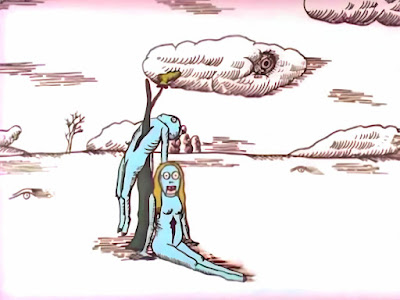Thank you once again, BoingBoing, for introducing us to a groovy animator and a groovy short film, a groovy short film that is but one groovy short film of many groovy short films that the groovy animator has made.
The animator in question is the historically important Japanese Yoji Kuri (above), who was born Hideo Kurihara on 9 April 1928 in the coastal city of Fukui, which is a "Sister City" of swinging New Brunswick, New Jersey, and Fullerton, California. Why Yoji changed his name, we know not, but sometime in the late 50s (or early 60s — different websites give different dates) he co-founded the independent animation collective Animation Sannin no Kai (i.e., Animation Association of Three) with Ryōhei Yanagihara (17 Aug 1931 – 17 Aug 2015) and Hiroshi Manabe (3 Jul 1932 - 31 Oct 2000). Kuri's work was "a favourite among the fervently counter-cultural audiences [of the 60s], which included such filmmakers as René Laloux [(13 Jul 1929 – 14 Mar 2004), the director of Fantastic Planet (1973)]."
BoingBoing quotes Swapnil Dhruv Bose (without credit, oddly enough) at Far Out: "A leading figure within the landscape of independent animation in Japan, Kuri's work played an important role in shaping the unique sensibilities of Japanese animation in the 1960s. [...] Kuri's approach to animation conducted a radical examination of the artistic frameworks through which contemporary animators were viewing the world around them. During his tenure as a filmmaker, Kuri made around 40 short films, but one of the most interesting examples of his contributions to the cinematic medium is a 1972 gem called The Midnight Parasites. Set in a relentlessly unforgiving world, The Midnight Parasites pushes the logic of modern capitalism to its logical conclusion. Kuri's world is populated by entities who are stuck in an endless cycle of consumption and defecation, eventually blurring the lines between food and faeces."
BoingBoing quotes Swapnil Dhruv Bose (without credit, oddly enough) at Far Out: "A leading figure within the landscape of independent animation in Japan, Kuri's work played an important role in shaping the unique sensibilities of Japanese animation in the 1960s. [...] Kuri's approach to animation conducted a radical examination of the artistic frameworks through which contemporary animators were viewing the world around them. During his tenure as a filmmaker, Kuri made around 40 short films, but one of the most interesting examples of his contributions to the cinematic medium is a 1972 gem called The Midnight Parasites. Set in a relentlessly unforgiving world, The Midnight Parasites pushes the logic of modern capitalism to its logical conclusion. Kuri's world is populated by entities who are stuck in an endless cycle of consumption and defecation, eventually blurring the lines between food and faeces."
An independent filmmaker, Kuri's work displays a noticeable disinterest in any commercial sensibilities, tending far more towards personal, artistic expression. His drawing style is primitive, even childish, though his topics are generally anything but the latter. The Midnight Parasites is a visual travelogue through an alien landscape, born from the nightmares of Bosch and Breughel, populated by creatures of all kinds and all sexes, known and unknown. There is less a narrative than a steady and surreal continuation of blackly comic scenes and situations, some peaceful and some destructive, often tinged with a disturbing sexuality that can verge on misogynistic.
The Midnight Parasites (1972):
The soundtrack to The Midnight Parasites was supplied by Isao Tomita (22 Apr 1932 – 5 May 2016), whom some out there might recognize simply as Tomita, a pioneer of electronic music along the lines of Wendy Carlos. Alongside his production of original music and LPs, Tomita did the music to numerous films, ranging from the mid-career Kinji Fukasaku (3 Jul 1930 – 12 Jan 2003) film Black Lizard / Kuro tokage (1968 / trailer) to the hard-to-find Prophecies of Nostradamus / Nosutoradamusu no daiyogen (1974 / trailer); from the very Japanese fantasy horror Demon Pond / Yashagaike (1979 / scene) to the two (of three*) X-rated but hardly pornographic animated films by Eiichi Yamamoto (22 Nov 1940 – 7 Sept 2021), A Thousand & One Nights / Sen'ya ichiya monogatari (1969 / trailer) and Cleopatra / Kureopatora (1970 / trailer). Years ago we were always lucky enough to find our Tomita LPs (like our not Wendy but Walter Carlos LPs) in thrift stores; should you stumble upon one somewhere, spend the bucks and buy it.
* The third being the underground classic Belladonna of the Sadness (1973 / trailer).
* The third being the underground classic Belladonna of the Sadness (1973 / trailer).
As an extra, Yoji Kuri's earlier short
AOS (1964):
"Whereas the age of a live-action film, no matter how classic, can always be discerned by the appearance of its actors, the cinematography, and the style of acting and direction, great animation has the capacity to be timeless. Take Yoji Kuri's short AOS. It was made 46 years ago [59 years ago], yet the visuals feel as raw and disturbing today as when it first appeared. [Cartoon Brew]" The last can easily be said of The Midnight Parasites as well.




No comments:
Post a Comment